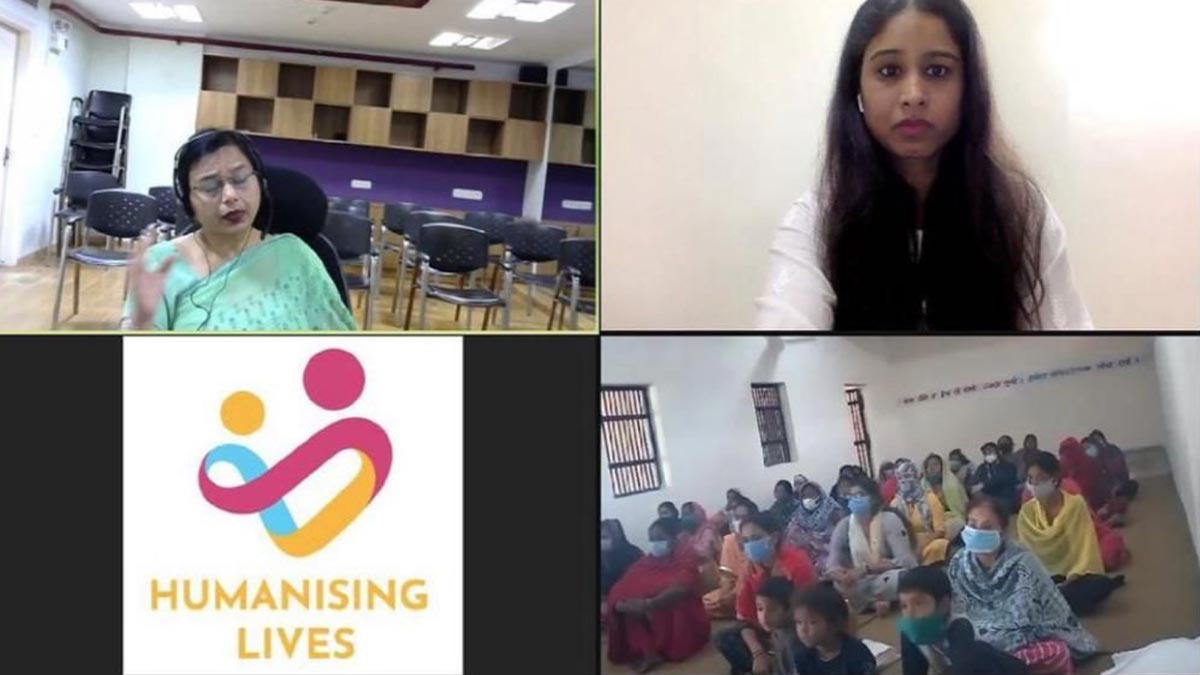
For more than 2 years, we are threatened because of the Coronavirus and the world was under a lockdown. Although the situation is a bit under control right now but we are still under the radar. These two years have been extremely difficult for all of us and this virus has not only affected our physical health but also, our mental health.
Several people have been harmed mentally which eventually leads to physical harm. Therefore, there was a need to help such people. After witnessing the increasing number of mental health problems, Ekta Prakash Sharma decided to help them and started an NGO, Humanising Lives.

In an exclusive conversation with Bhavishya Bir from HerZindagi, she revealed her journey and all about the NGO. Read on.
Firstly, thank you for the acknowledgement; it is very motivating to hear this in order to continue forward. Secondly, answering your question, This organisation is the combined efforts of all my encouraging colleagues and friends from various walks of life who contributed directly and indirectly to whom I am eternally grateful.
Humanising Lives is a non-profit organisation which is dedicated to enabling individuals in leading humane lives by dedicatedly supporting them to heal themselves from the different hues of traumas as we traverse this journey called life. The current blanket of pretence which we are often made to enrobe ourselves in, that everything is normal has only made us susceptible to poorer health in both physical and mental terms. The idea for the need for an organisation like Humanising Lives emerged out of this very need to address the background of trauma that people face in their everyday lives, leading to debilitating functioning and decreased quality of life.
I believe in between the toil and moil of graduating college and working incandescently for the equality of rights for all through initiatives that contributed to the emancipation of women and children in correctional settings; I began to make headway for what is it that I want to provide back to society and well the pandemic was definitely the final nudge I needed to take that leap of faith in order to make this fervent dream a reality. The dream and the new reality that is Humanising lives. The pandemic presented the glaring need for us to be increasingly aware of the current scenario of mental health and the amplified need for Psychological services due to the major theme of bereavement, depression and anxiety.
There is definitely a need and scope for greater outreach. For now, we're invested in social media platforms and are currently relying on that means for reaching a greater audience. The current people working towards the same vision were my colleagues and friends from other walks of life who believed in this small dream of mine. We have on board some of the leading psychologists from Delhi who conduct therapy sessions, train interns and provide their expert supervision for the cases as well. Hence, we have psychologists offering services for different concerns like trauma, depression, anxiety and grief to name a few with a multi-cultural focus on their chosen modality and the results have definitely paid off.

The non-profit beliefs in both the propagation and service of mental health information. For the latter, it uses various social media platforms and the website to provide context on why it wants to help, as well as other themes surrounding mental health awareness and linked webinars and conferences. Humanising Lives has impacted around 7000 people in Delhi and across India, as well as clients in Kenya, Nigeria, London and a few places in Canada and USA.
Through the organisation, we have taken initiatives to provide group therapy services to members of the LGBTQ+ community, by running a Queer Support Group. In addition to individual sessions
We have a programme for Reintegration and Rehabilitation for prisoners with Dr Kiran Bedi’s India Vision Foundation, which provides psychotherapy and counselling to ex-offenders from different prisons as part of the prison rehabilitation.
Unfortunately, In our squalid and economically underdeveloped climate, I believe India has always been focused on its basic survival needs of food and living. However, in our rush to survive, we overlook many vital factors, such as our mental and emotional health. This increases the risk of burnout among our people, particularly at these times of global and national crisis. The strain on our enormous, as their resilience is continually put to the test. As a result, people must recognise and actively participate in dialogues about mental health, work-related stress, and personal life.
Being heard is an undervalued service, and communicating your thoughts to another person is a difficult task but it is absolutely necessary.
We have to transcend our auto-pilot mode of living of just imbibing things as we grow up and actively engage ourselves in meaningful and authentic efforts to do something for ourselves and for the greater collective. Sometimes, there is solace that can be found in finding the source/ the 'it' experience that may have started it all whereas for others it is moving past the identifying point and moving on. Whatever it may be, acceptance looks different for different people. That is where I'd like to personally encourage people to start. Acceptance. Then, the suffering that one may be going through would probably look a lot more like growing a garden; you start with the dirt, and you end up with flowers of your patience and kindness toward yourself and others.

We have our website, https://www.humanisinglives.com/ and we also have social media handles where we are very much active and respond efficiently. On Facebook, we go by @humanisinglives (NGO) and on Instagram as @humanisinglives itself.
Don't Miss:HZ Women Of The Month: Krushnaa Patil’s Summit To Mount Everest
Future plans seem a bit intimidating and exciting to think about. Intimidating in terms of the lives we'd like to help and the responsibility that would bring with it an exciting because we can all fully realise the power of our efforts and the transformations that are to occur as a result of our initiative.
Through our initiatives, we were also able to identify something very important about our default culture of not 'speaking up for ourselves and what we have faith in. Emphasis and value are placed on silence about anything that might be deemed controversial. Our families work hard to protect the feelings and well-being of the other members. However, this comes at a great cost to everyone in the group. This loop we're stuck in of either shutting oneself down or others to maintain imaginary standards and respect has only been realised to be futile.
This is our time to speak as every whisper eventually starts to echo and we are hoping to break the stuffing in culture with our future initiatives.
For more such stories, stay tuned to HerZindagi!
Also watch this video
Herzindagi video
Our aim is to provide accurate, safe and expert verified information through our articles and social media handles. The remedies, advice and tips mentioned here are for general information only. Please consult your expert before trying any kind of health, beauty, life hacks or astrology related tips. For any feedback or complaint, contact us at compliant_gro@jagrannewmedia.com.